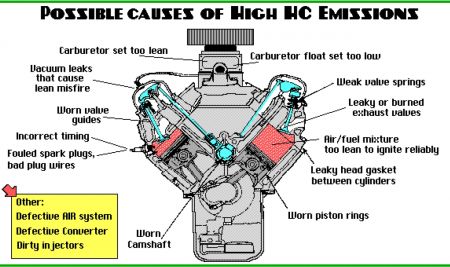CAUSES OF ELEVATED HC EMISSIONS Elevated HC emissions, which are measured in "parts per million" (ppm) with an exhaust analyzer, are most often caused by: * Ignition problems -- This includes fouled spark plugs, bad plug wires, a weak ignition coil, excessive rotor gap or a cracked distributor cap. * Lean misfire -- The fuel mixture is too lean to ignite because there is too much air and not enough fuel. Underlying causes may include air or vacuum leaks, clogged or dirty fuel injectors, low fuel pressure (weak pump, bad fuel pressure regulator, clogged filter, line restrictions), or carburetor float level set too low . * Loss of compression -- Most likely a burned or leaky exhaust valve. Other possibilities include a leaky head gasket, broken or weak valve springs, worn cam lobes. * Oil burning -- Due to worn valve guides and seals, worn piston rings and/or cylinders. Hydrocarbon formation is highest when a cold engine is first started due to the rich fuel mixture and slower rate of fuel vaporization. HC emissions also increase momentarily when the engine is under load. Hydrocarbon emissions can be minimized by maintaining a balanced air/fuel ratio, making sure the engine has reliable ignition (proper plug gap, clean plugs, good wires and distributor cap, etc.), and having good compression and close tolerances in the engine (piston rings that are fully seated and seal properly, valve guides and seals that don't leak oil, etc.).
Some HC is always formed in the combustion chamber because the fuel never burns completely. The hydrocarbons that are formed and pass into the exhaust are "reburned" in the catalytic converter and transformed into water vapor and carbon dioxide. A late model engine in good running condition, properly tuned and with a good converter should produce HC exhaust readings at the tailpipe of almost zero, and certainly less than 50 ppm. A good running engine without a converter should produce less than several hundred ppm HC
idle. HC LEVELS HC levels are usually read in parts per million (ppm). "Acceptable" HC levels will vary depending on the model year vehicle, but generally speaking HC should be within the following ranges: 1967 and earlier vehicles 300 - 500 ppm 1968 - 1969 200 - 300 ppm 1970 - 1972 150 - 250 ppm 1973 - 1974 100 - 200 ppm 1975 - 1978* 100 - 150 ppm 1979 - 1980* 100 ppm 1981 & up* 50 ppm * Readings are taken with the air injection system disabled. On newer vehicles with the air pump or aspirator system operating, HC levels should only be a few parts per million or almost zero.

SPONSORED LINKS
Friday, September 17th, 2010 AT 3:01 PM




